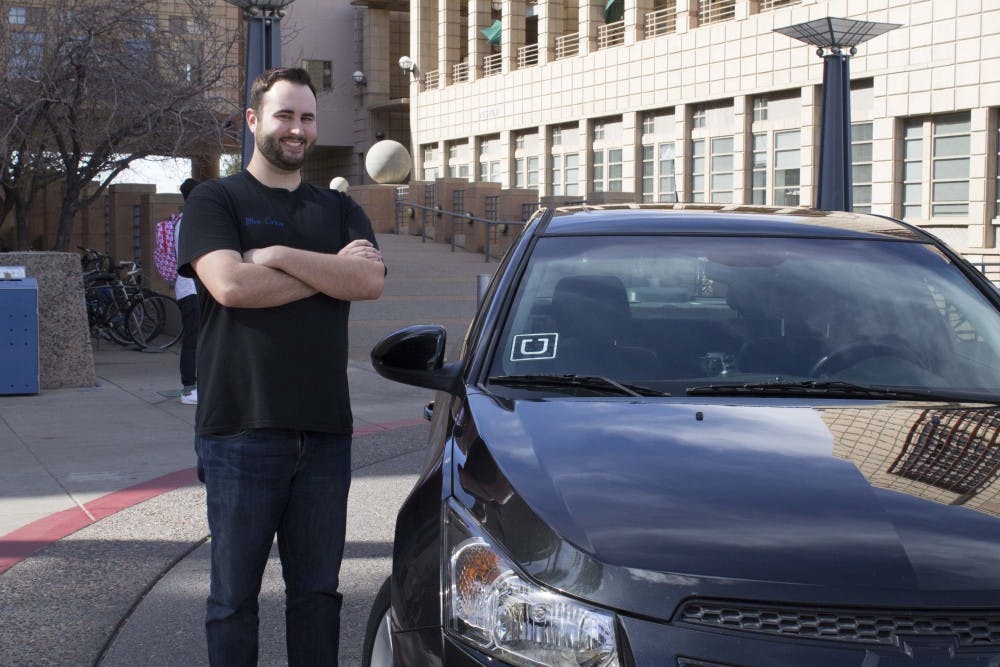Regulations make it hard for small businesses to operate and function with ease. They decentivize businesses from growing and competing. They may have good intentions, but they come with devastating costs.
Uber and Lyft are two of the most convenient forms of transportation that have emerged over the past several years. They have made lives of so many people easier, especially for college students all throughout the nation, including ASU.
The wait for a taxi could last 20 minutes, whereas ride sharing can be much more convenient. Additionally, they are useful for students without cars and more cost-effective than taxis and other modes of transportation.
In November 2015, Governor Doug Ducey and 21,000 other people signed a petition allowing for Lyft and Uber to able to pick up passengers at Phoenix Sky Harbor Airport.
Last May, the Phoenix City Council approved of allowing Uber and Lyft to pick up passengers at Sky Harbor Airport. This did the city a huge favor and made life easier for the people of Phoenix and other neighboring cities, including ASU students.
I support 21-century innovation in #AZ — so I signed @uber's petition to allow @Uber_AZ to pick up at @PHXSkyHarbor https://t.co/VAkmDmu3Zf
— Doug Ducey (@dougducey) October 31, 2015
As mentioned in a 2016 State Press story, city mandates made things rather inconvenient for ASU students. Students could take an Uber to the airport, but not return from it.
Uber and Lyft have been very helpful to college students. Uber even offered special codes to college students as part of a “College is Hard — getting a safe ride shouldn’t be” program.
According to Uber's website, “whether it’s an all-nighter at the library, or an all-nighter with friends — we want to help get you home safely.”
During an event hosted by the ASU Federalist Society called “Regulating the Sharing Economy,” three speakers discussed how regulations on these types of businesses hurt or help society.
“How many elderly people are now affordably mobile because of Uber, how many drivers have a source of income for their families that they would never otherwise have ... how many DUIs have been avoided because of ride sharing, how many lives have been saved,” said Jonathan Riches, the director of National Litigation for the Goldwater Institute’s Scharf-Norton Center for Constitutional Litigation and General Counsel for the Institute.
Often times, regulations do more harm than whatever good they are trying to achieve.
“Regulators in good faith try to solve some sort of problem or make the world better in some way, Uber and Lyft don’t provide benefits or don’t pay overtime to their drivers — so let’s make sure that there’s a proper employer-employee relationship and get them all those benefits,” said Ilya Shapiro, senior fellow in constitutional studies at the Cato Institute and editor-in-chief of the “Cato Supreme Court Review."
“The problem is that would decrease the flexibility of Uber — what makes these attractive both to drivers and passengers in the first place.”
When a state or local government starts to impose regulations on businesses, it hurts many small and big businesses that help people in their communities.
There are numerous examples of companies being forced to move to another part of the country to avoid pay higher taxes or unnecessary regulations.
According to the Foundation for Economic Education, the city of Austin, Texas essentially forced Uber and Lyft companies to relocate. More than a year ago, the city council passed a “package of burdensome fingerprinting requirements for ride sharing companies.” Whatever ride sharing companies that were left “issued soaring prices, posted inaccurate information and left countless riders without any options to get around.”
This type of regulation was pushed forward as a way for the taxi lobby to maintain a monopoly. The Uber and Lyft drivers there were restricted from going to certain areas, just as the Uber and Lyft drivers in Phoenix were.
Essentially, when the Phoenix City Council approved of allowing Uber and Lyft to pick up passengers at Sky Harbor Airport, it did the city a huge favor and made life easier for the people of Phoenix and other neighboring cities.
We should strive to keep these type regulations out of Phoenix and all throughout Arizona. Regulations harm small businesses that are trying to compete in the market.
Due to California’s incredibly high regulations and taxes, businesses are relocating. A year ago, the headquarters of Carls Jr. decided to move because “the highest income tax rate in California is 13 percent, so moving to Tennessee, where the tax rate is zero, will save the company millions of dollars on taxes a year.”
Uber and Lyft should be safeguarded from regulations. They make the lives of so many people in the U.S. much easier. Regulations imposed on them by the government does a great deal of harm to the people in those communities.
If they are enforced, we could potentially see these businesses moving away from our city, which could have a major detrimental economic effect on our communities.
Reach the reporter at vpappuse@asu.edu or follow @vpappuse on Twitter.
Editor’s note: The opinions presented in this column are the author’s and do not imply any endorsement from The State Press or its editors.
Want to join the conversation? Send an email to opiniondesk.statepress@gmail.com. Keep letters under 500 words and be sure to include your university affiliation. Anonymity will not be granted.
Like The State Press on Facebook and follow @statepress on Twitter.




